At this hour of global crisis due to the novel coronavirus, people are not just concerned about themselves but also their pets. Although studies report and pieces of evidence show that dogs are not responsible for spreading the disease, it is best for us and our fur-friends to stay prepared and safe.

While all of us are expected to follow social-distancing, this is the best time to cozy up with your canines at home and stock up on essentials for you and your pet. But are there chances that your pet may spread the coronavirus? Do we need to distance ourselves from our pets too?
We have answered these questions and gathered some reliable information for you and your pet to remain healthy and panic-free during this worldwide pandemic.
Contents
According to WHO, there is no evidence that dogs can get or transmit the novel coronavirus or COVID-19 virus in any form. The COVID-19 virus is a respiratory disease that is known to spread through air droplets and can transmit through direct contact. So far, it has only spread through human to human transmission.
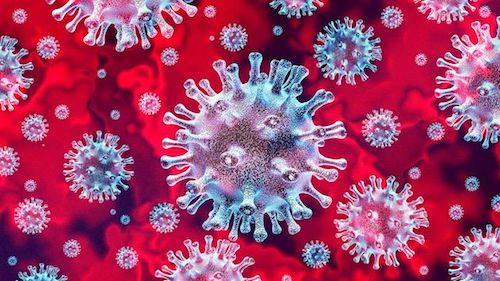
Some people believe that the virus droplets can be present on the skin and fur of dogs which is not true. The virus is known to survive better on smooth surfaces, pet hair being rough and uneven at times, makes it difficult for organisms to survive longer on their body surface.
As of date, the Centre for Disease Control and Prevention (CDC) states that dogs are not contracting the disease from humans, although this remains to be a matter of controversy. Neither are there any evidences that dogs are the source of the virus as per rumors in the United States. Staying away from animals if there are no symptoms observed in both you and your pet would only make your pet emotionally weak at such times.
Talk about dogs contracting coronavirus from humans, two recent cases in Hong Kong have got may pet owners wondering about the same; can humans spread coronavirus to dogs? While coronavirus has been spreading rapidly from human to human contact, reports of the pandemic spreading from human to dogs is still a mystery.
Two dogs in Hong Kong got tested positive for the novel coronavirus after living in close contact with their owners who were suffering from COVID-19. One of them was older and had lived longer than its usual life span of 12-16 years which may have been the underlying cause of its death. There is no evidence to support that the virus was transmitted from the human to the pet.
Another report of a 17-year-old Pomeranian came across while its owner was hospitalized due to the COVID-19 infection. The pet was known to have contracted ‘low-level COVID-19’ infection and has died. The owner has not allowed the dog to be autopsied so the cause of death remains unknown.
The dog was quarantined for a span of 12-15 days after it finally tested negative for the virus and was allowed to go home. Two days later, the animal’s owner, a 60-year-old woman who was tested positive and returned home after recovering, reported that the dog had died. Few reports claim that the stress of being separated from its owner for a long span would have caused the death.
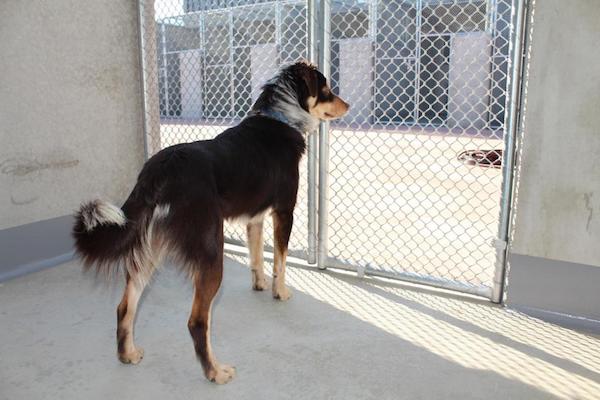
With such cases, measures are being taken to quarantine pets belonging to households with confirmed COVID-19 cases and will be placed under surveillance for 10-15 days. People reported positive of the COVID-19 virus should practice isolation from other humans as well as pets and animals.
As per WHO, there is no evidence or studies to support that dogs can contract the virus from humans.
Claims by CDC and WHO clearly state that there is no proof to support the fact that dogs are spreading the novel coronavirus. If dogs come in contact with an infected person, there are chances that it may contract the disease. Hence, it is best to keep yourself and your pet in isolation during these hours.
The virus is known to have emerged from an animal source in China but transmits from human to human. There are no cases that have shown that the virus has spread through dog to human contact however studies on human to pet transmission are still on.
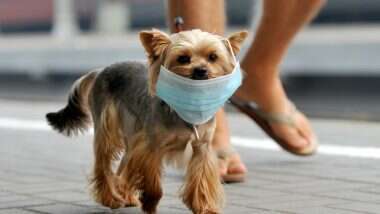
The CDC has also reported that companion pets are in no way responsible for spreading the novel disease and no measures need to be taken unless you sense any exposure. This may end up causing a false scare that can compromise on your pet’s overall care and health that it receives from you.
If a dog has been with or comes in contact with a person who has tested positive for COVID-19, the dog can contract the disease as the virus can survive in your dog’s respiratory regions. It is best to keep the pet in isolation at such times.
While dogs are not seen to be showing any symptoms nor are spreading the disease, they also suffer from a different type of coronavirus. Canines usually suffer from Canine Enteric Coronavirus (CECov). Young puppies are affected by the disease majorly.
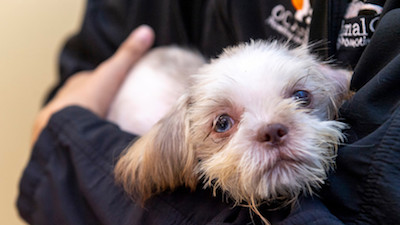
Canine coronavirus is a highly contagious intestinal disease and is specific to only wild and domestic animals. Common symptoms include vomiting, diarrhea, dehydration, etc. If it severes to causing enteritis (inflammation of the small intestine), it can lead to death.
Canine coronavirus cannot affect humans and is only restricted to pets. Some people claim that the source to the COVID-19 virus could be the canine coronavirus but the causative agents of both are different. There are minute chances of the canine coronavirus mutating and causing the disease in humans.
How Can I Keep Myself and my Pet Safe?
At these times where you are expected to follow personal hygiene and maintain social distancing, it is best to have your pet following the same as they may carry pathogens which can make you sick.
Having a pet around makes it all the more important to maintain hygiene. Here are a few things you can follow:
- Wash your hands properly with a bar of soap after handling your pet’s waste, food, supplies, etc for at least 20 seconds.
- Avoid touching your eyes, nose, and mouth.
- Avoid and prevent your dog from coming into contact with sick people.

- Stay home and keep yourself and your pet isolated as much as possible.
- Cover your mouth while coughing and sneezing and use a tissue, dispose of the tissue immediately after use to avoid spreading of the virus.
- Clean your dog after every activity including eating, playing, after a walk, etc. Wipe them up properly after bathing. Here are some ways to clean them:
- If your dog has dusty paws, use a wet towel to clean them. Vet approved wipes free of chemicals or alcohol are highly recommended for their sensitive paws.
- A thorough washing is recommended for all the debris stuck between their fingernails and fur. A mild dog shampoo is not a bad idea to rinse the dirt off.
- Check for cuts or abrasions in your dog’s body. Minor open wounds are more susceptible to developing infections rapidly.
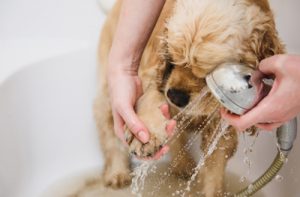
- Avoid unnecessary visits to the veterinarian or nursing homes. If required to visit for an emergency, take preventive measures like using a mask and maintaining a safe distance from people.
There is no major requirement of distancing from your pet but you can take the best preventive measures by not sharing your food and belongings with them. Avoid kissing and hugging your dogs too much, avoid getting licked by them too.
Ask all other family members handling the dog, especially children, to also follow these practices to keep the disease from spreading and maintaining good hygiene.
REMEMBER, THERE IS NO NEED TO ABANDON YOUR PETS DUE TO FEARS of the Coronavirus.
There is no evidence that coronavirus is spread through dogs but these practices of common hygiene can be maintained for life irrespective of the virus spreading or not.
What about my pet’s playtime and outdoor activities?
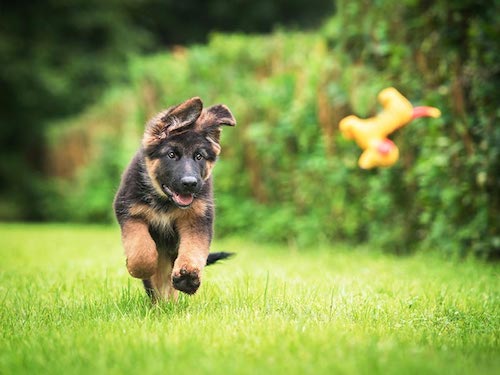
Play and exercise time are extremely important for your pet. But just as we have been asked to follow social distancing, so is it advisable for our pets. If you have a small backyard or garden that is isolated, you can definitely take your dog there for playtime and exercise.
Avoid going to crowded areas like public gardens or jogging tracks as well as heavily trafficked areas. You can consider changing your pet’s walking times and venture out at less crowded hours to avoid any chances of you and your pet contracting the infection. Check with the social distancing and lockdown policies in your area before moving out.
As a pet owner, wash your pet or clean their paws with wipes and wash your hands thoroughly with soap for at least 20 seconds after each walk. Carry a bottle of hand sanitizer with you in cases of emergency and if you do not have a soap bar at your dispense.
How can I keep myself and my pet isolated?
There is nothing to panic about if you may have to isolate yourself with your pet or if you have been asked to stay in quarantine. You can ask any of your close relatives or friends to take care of your pet until all is back to normal.
Talk about staying in isolation with your pet to avoid contracting the disease and following the curfew practices, there is a lot to do with your pet at home. Firstly, it is extremely important for both you and your pet to maintain good hygiene practices. Wash your hands thoroughly with soap after touching your pet’s belongings.
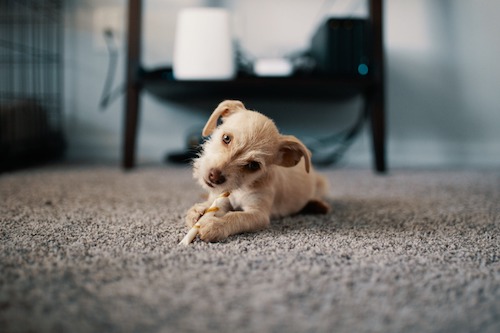
During isolation, it is best to stay indoors or in the nearby premises if safe. It would be difficult to take your dog for a run or walk at all times except for if you have a garden or backyard.
Your dog may need regular access to the toilet so make sure to keep the garden or backyard in access. You could also go just outside your house during your dog’s pee and poo time.
If you are worried about your pet’s health in general during self-isolation you can always call your vet and ask for help. It is advisable to stay at home and consult rather than visiting the clinic at such times unless there is a grave emergency.
Although there is no evidence to support the fact that humans can transmit coronavirus to animals, it is best to distance yourself from them just like you would do with people.
If you are worried about your pet, you can inform a close relative or friend to take care of your pooch for you or inform the local health protection team about your pet.

Restrict your contact with dogs or animals, especially snuggling, cuddling, kissing or getting licked by your pet. Avoid sharing your food and other belongings with your dog. Wash your hands thoroughly and also make sure to keep your dog clean to avoid the conditions from severing. You could wear a face mask as an extra precautionary measure.
If you have been asked to quarantine as a dog parent, you would surely be concerned for your pet too. Make a list of items you may need to stock up on for your dog. These include food and water, preventive medications and hygiene supplies, etc. Ask someone to stay at your house to take care of your canine until things stabilize.
FAQs
Dogs are not being considered to spread the coronavirus or cause any diseases. Previous cases where dogs were known to stay with the person infected with the virus, the pets did not show any signs and symptoms of illness.
When it comes to contracting canine coronavirus, the symptoms are not very significant. Sometimes your dog may experience slight vomiting and diarrhea and enteritis in severe cases.
Centre for Disease Control and Prevention (CDC) recommends that you do not need to get your pet tested for the COVID-19 virus. If your pet feels ill or unusual, you may want to call your vet and visit the clinic only if necessary. There are slightest chances of the COVID-19 virus spreading through dogs and hence getting them tested would not be necessary.
As of now, there is no confirmed test or study to prove that dogs are immune to the COVID-19 virus. So far, the transmission has been happening through human to human contact.
Pets who have stayed with people who were tested positive for coronavirus were quarantined and tested for the same. Only two cases so far have turned to be positive which is not sufficient to prove whether dogs are immune to the virus or not.
There are no studies to prove that dogs can spread the novel COVID-19 virus. Although, they can certainly spread other diseases that are categorized as zoo tonic illnesses. Most of the emerging infections are known to spread from animals. They can transmit diseases via body fluids, feces, food and water bowls, saliva, etc. just as humans can.
E. Coli and Salmonella infections occurring through raw eggs and meat are a form of infection through animals. This also includes traces of fecal matter or animal waste on surfaces of food items which can cause infections and illnesses.
These diseases can majorly impact children and the immunocompromised as well as adults above 65 years of age.
Yes. It is possible. If your dog comes in contact with a COVID-19 virus carrier or patient who coughs or sneezes on your pet, and if you touch your dog, there are chances you may contract the disease. Here, the animal is not the source but the medium of spreading the disease.
Although, the risk of transmission is low as the virus is known to settle on inanimate surfaces and not on soft surfaces like animal fur. But, just as the way people living with sick individuals should avoid contact with others; similarly, dogs living with sick people should avoid coming in contact with other animals and humans.
At this hour of crisis, it is very important to keep yourself and your pet geared up to face adverse conditions. In order to keep your pet safe and prepared, stock up on its essentials and keep an emergency pet kit handy along with its medicines and hygiene-related items.
Make note of a list of veterinary hospitals and some emergency contact numbers of relatives and friends to take care of your pet if you fall ill and need to be isolated. Keep your pet’s medical records handy if it needs to be at the vet in times of emergency and you may not be able to cater to your dog.
Lastly, keep yourself informed about the latest updates on the COVID-19 virus from the Center for Disease Control and Prevention (CDC) and the American Veterinary Medical Association (AVMA). There is no need to panic at such an hour of crisis. Rather, it is important to remain calm to take care of yourself and your pet.
The Final Word
While there are studies being carried out about the novel coronavirus and how it has progressed and manifested in humans, there is no valid proof claiming that dogs can spread or get the disease themselves.
Although, if you have a pet at home and have been asked to stay in isolation, make sure to follow regular hygiene practices to keep yourself and your dog safe. In times where you may fall ill or might get reported positive of the COVID-19 virus, there is nothing to panic as you can ask someone else to take care of your pet or contact the local health protection team.
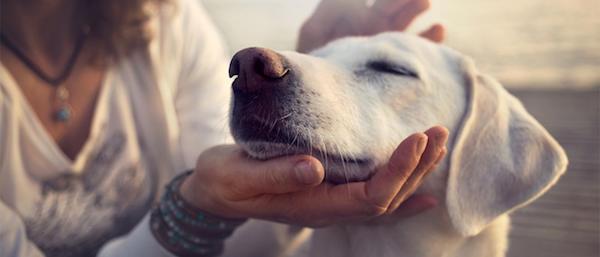
It is advisable to stay indoors and limit outdoor activities with your dog as also avoid going to crowded areas. In cases where your dog is not feeling well, try consulting the vet over the phone and not visit their clinic unless its an emergency during such situations.
Do not give away on the love and compassion your dog deserves from you. The best we can do to avoid the virus get over us is to stay safe at our homes and keep our dogs safe and healthy.
